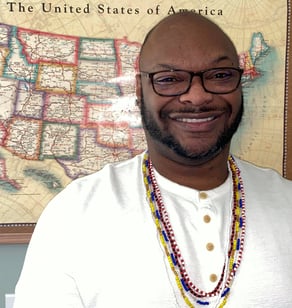Recent events, such as the police killing of George Floyd, have sparked emotional yet essential national conversations about the role that race and privilege play in American society.
I always stress to my students that privilege in and of itself is not necessarily a bad thing; it’s what we do with our privilege that matters. For example, I did not ask to be born a cisgender male or to be given the privileges that come along with being a cisgender male. In my case, a genuine commitment to DEI begins with me assessing and acknowledging those privileges and how they benefit me in society.
One way I teach about privilege is by bringing my classes outside and having them stand in a big circle. Then, I read off a series of statements, like, ‘I’ve never worried where my next meal would come from’ or ‘Both of my parents have college degrees,’ and if it applies to them, they take one step forward for each statement. By the end of the activity, they can look around and see that privilege is not just about race.
It’s important for all of us to assess our many privileges because there are groups in society who have been marginalized and whose perspectives have been historically dismissed. For the Spartan community, the fact that we are affiliated with MSU is, in and of itself, a privilege.
How do we change a system set up to benefit a small select group to the detriment of everyone else? It helps when we ask ourselves questions like, “How have I benefited from inequitable systems? How can I use my privilege to bring others to the table?” Or “How do I help them build their table?” Again, this is not about attacking people. This is about changing an inequitable system.
There are some tables where I don’t belong, and I’m okay with that. It’s important to know when it’s time to stay in your lane. But when people from those tables invite me to theirs, it’s a privilege that bears a lot of responsibility. When I navigate spaces and communities that are not my own, I bring all my perspectives with me and do so with cultural humility. I have a habit of telling communities, “I can talk about the science of human behavior all day long. But I’m not an expert in your community or lived experience, and I’ll never be. Therefore I’m here to learn.”
During the COVID-19 pandemic, I was able to take time to process the racism that I have experienced — both directly and indirectly — through my life as a Black American and an academic.
When I was in elementary school more than 30 years ago, I remember being called racial slurs. When I graduated from high school, I was one of two Black honors students in a graduating class of over 300 people. In my first master’s and PhD programs, I was the only black man and the first to earn a PhD in my program. Throughout my academic career, I have had to navigate spaces while being “the only” or one of a handful of individuals who looked like me. In each of those instances, I experienced being discounted or dismissed because I’m Black.
Some of my peers may not understand this, but I’m always concerned that I will be another statistic when driving to or from work. It’s always at the forefront of my mind; every time I make it home or make it to the faculty parking lot, I always whisper a prayer of thanks that I made it there safely and was not pulled over and shot. Even when I’m out shopping, I have the concern that I will be racially profiled.
 This August will mark the first time many Spartans will live, work and learn on campus after more than a year of being remote.
This August will mark the first time many Spartans will live, work and learn on campus after more than a year of being remote.